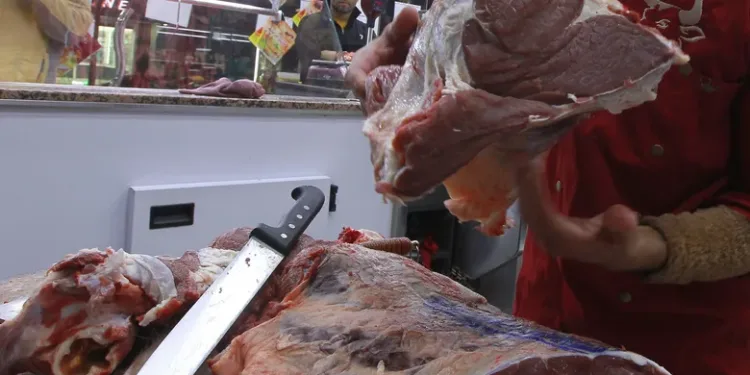Algeria is grappling with a surge in demand for beef during the Muslim holy month of Ramadan, prompting massive imports of beef and lamb to stabilize prices amidst economic challenges. As the country’s economy continues to struggle, importing food and fuel has become essential to meet the needs of Algerians observing nightly feasts after breaking their fasts at sunset.
In response to the heightened demand, Algeria, an oil-rich North African nation, is among several countries importing meat to accommodate the requirements of its populace. Butchers in white coats are now serving customers at newly established imported meat stores, offering beef sourced from distant countries like Australia. This influx of imported meat has elicited a mix of excitement and skepticism among Algerians.
For Algerians preparing for Ramadan festivities, the availability of imported beef provides a sense of relief, ensuring ample supplies during the holy month’s traditional gatherings. However, skepticism lingers regarding the quality and authenticity of imported meat, particularly when sourced from distant locations. Despite the excitement surrounding the availability of meat from abroad, questions arise about its freshness, taste, and adherence to local dietary preferences.
While the importation of beef and lamb aims to alleviate immediate shortages and stabilize prices, it underscores Algeria’s reliance on foreign markets to meet essential food needs. As the country navigates economic challenges, the success of these imports will depend on factors such as supply chain efficiency, consumer confidence, and the ability to address concerns regarding imported meat’s quality and origin.
“The opening of stores like this one is a breath of fresh air for those who can’t afford to buy local meat. As you’ve seen, the product is of high quality, and so much the better,” a retired teacher, Rabah Belahouane stated after waiting in line at a new store for 30 minutes.
Amidst Algeria’s ongoing struggle to curb inflation and cope with a rising cost of living, the decision to import beef comes at a time when meat prices remain disproportionately high compared to median income and minimum wage levels.
READ ALSO: How You Can Leverage Legal AI for Justice
Butchers acknowledge the challenges their prices pose to consumers nationwide but refute claims that hold them responsible.
“Local meat has become a luxury product, unfortunately, but it’s unfair to blame butchers for this,” remarked Salim Lamari, a 40-year-old butcher from east of Algiers.
Lamari explained that butchers rely on livestock farmers, who have been forced to raise prices due to drought and increases in the cost of animal feed.
How Algeria is addressing meats shortage
Algeria, traditionally skeptical of imports, responded to the crisis by issuing new import licenses to private businesses and state entities overseeing the meat industry.
The country has broadened existing contracts with meat suppliers in Argentina and initiated imports from Brazil, Spain, Italy, Ireland, Russia, and Australia, coinciding with the beginning of Ramadan.
The imported meat is vacuum-packed and transported nationwide in refrigerated vehicles to ensure freshness and quality. This shift in policy reflects Algeria’s recognition of the need to address domestic meat shortages and alleviate the financial burden on consumers amidst challenging economic conditions.
How much meats are consumed in Algeria?
Algeria, known for its significant meat consumption, typically imports around 103,889 head of cattle annually, including breeding, fattening, and beef cattle. These statistics, sourced from the World Organization for Animal Health, were reported prior to the surge in demand during Ramadan.
Additionally, Algeria is augmenting its imports with beans and onions to address recurring shortages in supermarkets and prevent price spikes experienced during last year’s Ramadan period.
What you should know
Algeria’s decision to import 100,000 tons of red meat this Ramadan marks a significant reversal of its previous policy, which had banned such imports. The earlier policy aimed to support domestic producers but faced criticism as the price of local meat surged.
Commerce Minister Tayeb Zitouni explained, “It’s the president’s decision to reopen imports to ensure that ordinary citizens can afford meat at reasonable prices, rather than being subject to exorbitant rates charged by local butchers for higher-quality beef.”
The import initiative coincides with persistently high meat prices compared to the median income and minimum wage in Algeria. The country has grappled with containing inflation and addressing the escalating cost of living.










